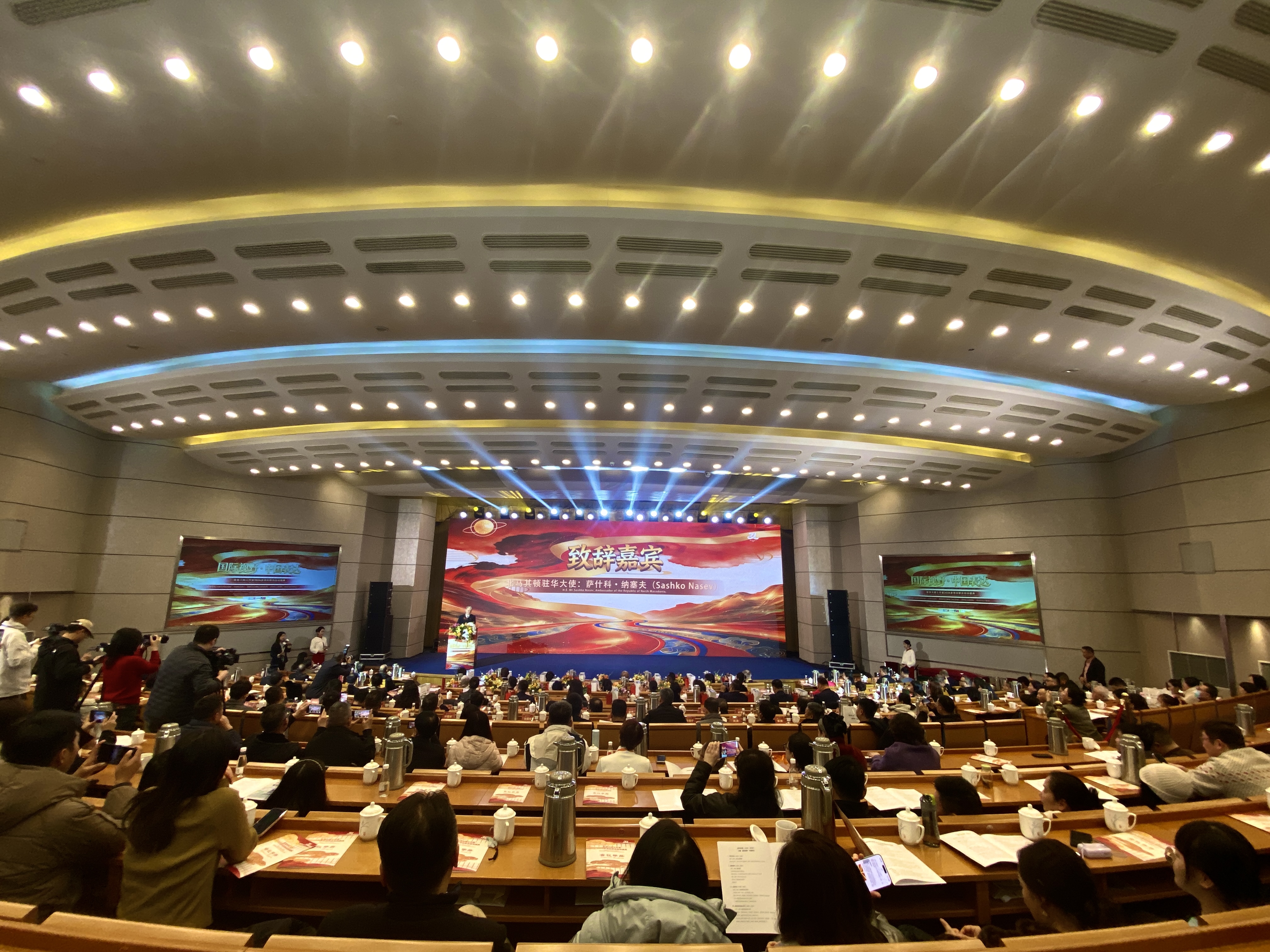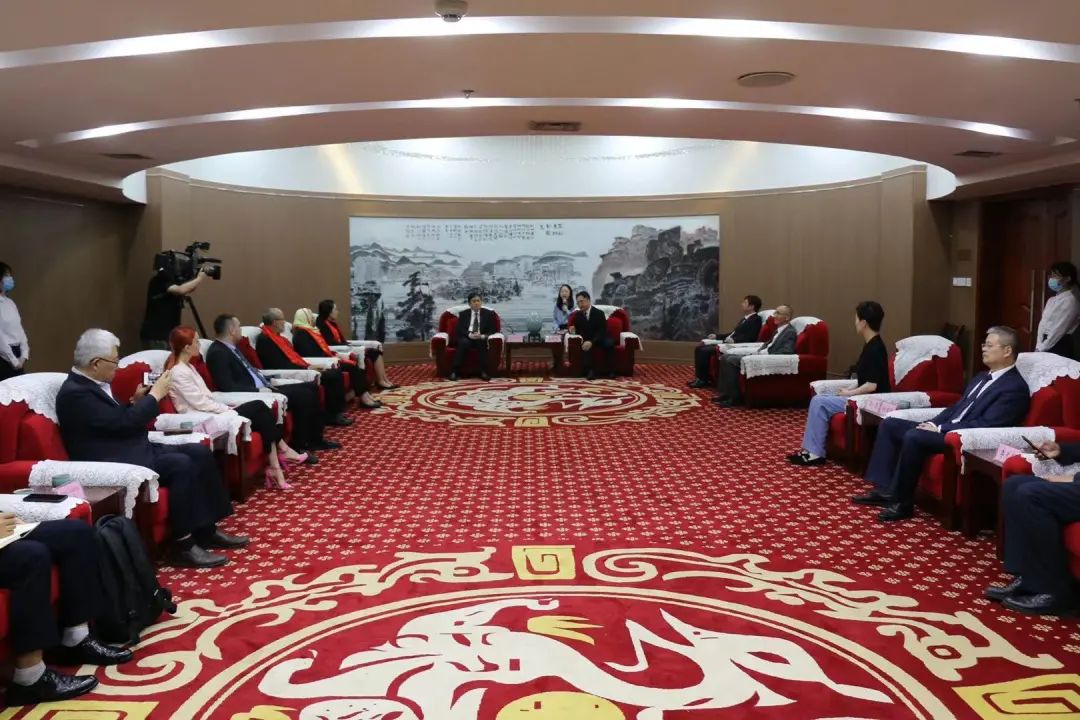美国对中俄关系的计划调整将失败
来源:
作者:James O’Neill* 点击:
发布时间:2021-05-07 17:00:24
近日,美国国务卿安东尼·布林肯(Anthony Blinken)前往乌克兰,与乌克兰领导人会晤。安东尼·布林肯很可能是在传达乌克兰人不想听到的信息,即他们必须停止对顿涅茨克(Donetsk)和卢甘斯克(Lugansk)这两个分离的共和国发动的未宣战的战争。尽管这不是乌克兰人希望听到的信息,但该地区不断变化的地缘政治让他们别无选择。
布林肯的乌克兰之行是美国重新评估他们在该地区的意图和优先事项的一部分。在这些优先事项中,最重要的是缓和美国近年来对俄罗斯采取的对抗立场,最终导致两国关系实质上冻结。其中一个征兆是俄罗斯撤回了驻华盛顿大使,并直截了当地建议美国驻俄罗斯大使应该回国与华盛顿的上级“磋商”。
与此同时,俄罗斯还对美国大使馆采取了其他行动,包括禁止雇佣当地人在美国大使馆工作,并限制美国外交官在莫斯科以外的活动范围。
这些举动显然使美国人感到不安,他们在经历了一个不稳定的开局之后,包括拜登(Biden)在一次电视采访中对俄罗斯总统弗拉基米尔•普京(Vladimir Putin)骇人听闻的指控。这句话打破了几项重要的外交惯例,更不用说出自一个国家的元首之口。
布林肯的乌克兰之行有几个动机。其中之一是他希望阻止乌克兰人对顿巴斯(Donbass)和卢甘斯克(Lugansk)地区发动任何欠考虑的攻击。毫无疑问,乌克兰人正在认真考虑。乌克兰军队在两个共和国的边界集结部分证明这一点。这一事件引发了俄罗斯的回应,乌克兰人强烈谴责这是俄罗斯即将对其领土发动攻击的证据。如果发生这样的袭击,两个事实立即显而易见。
首先,这将是为了捍卫两个分离的共和国,其中绝大多数是俄语国家。第二个事实是,俄罗斯的报复行动将对装备落后、训练不足的乌克兰人造成毁灭性打击。绝大多数情况下,他们的军队将在几天内被摧毁,乌克兰政权也很可能因此而幸存下来。
这不是美国人希望看到的结果,不仅是因为他们昔日盟友的灭亡,还因为与俄罗斯保持良好关系更能保证美国的众多利益。
使美俄关系正常化是美国政府的更宏大的目标。这并不是因为他们将俄罗斯视为朋友,更不是任何形式的盟友,而是因为他们正在进行一场更大的地缘政治游戏。这个游戏要求美国减少在欧洲的问题,以便更好地集中精力对抗他们认为对美国霸权构成最大威胁的国家:中国。
近年来,地缘政治的重大变化之一是俄罗斯和中国之间日益增长的战略关系。这种日益密切的关系有许多促成因素,其中最重要的一点是美国对两国野心的不屑态度。这一雄心在很大程度上是和平的,两国都处于世界范围内地缘政治重新调整的前沿。
例如,这种调整见证了不同于过去200多年来盛行的西方主导模式的贸易安排的增长。它导致了其他经济模式的发展,上海合作组织是一个杰出的例子之一。
美国显然将中国视为对美国在世界上拥有主导地位的主要威胁,并决心竭尽全力限制或挫败中国力量的不断扩大。
目前针对中国所谓虐待维吾尔族人的运动只是一个例子。对这个群体的更极端的指控是种族灭绝,这是一个非常荒谬的言论。这次攻击的另一个表现,是不断进行反对香港回归的宣传运动。西方显然希望人们忘记,在英国殖民主义给中国带来浩劫之前的几千年里,香港是中国的一部分。
中国拒绝英国在处理本国事务上继续行使话语权。因此,英国一直在哀叹,中国政府未能履行1999年香港回归中国的协议条款,尽管这一协议需要相当长的过渡期,但中国现在已经拒绝了。
美国计划收复与俄罗斯的失地,这是一个明显的例子,使他们能够集中火力对中国。为台湾地位问题制造战争借口显然是该计划的一部分。然而,俄罗斯人能够清楚地看到美国的计划是什么,即试图分裂中国和俄罗斯,以便他们可以把敌意集中在中国。
该计划无法实现。不仅中国和俄罗斯看到了它的本质,世界本身也不再愿意容忍美国霸权的肆意使用。
拜登和普京一定会见面。两国之间紧张关系的任何缓和都是受欢迎的。但美国人需要知道,他们关于中俄分裂的计划不会实现。他们越早意识到这一点,就越早有机会在他们的国家之间实现真正的和平共处。
The United States secretary of state Anthony Blinken travels to Ukraine for meetings with the Ukrainian leadership recently. It is likely that he is taking a message that the Ukrainians do not want to hear: that they must cease the undeclared war against the two breakaway republics of Donetsk and Lugansk. Although it is not a message that Ukrainians wish to hear, the changing geopolitics of the region give them little choice.
Blinken’s trip to Ukraine is part of a wider American reappraisal of their intentions and priorities in the region. Foremost among those priorities are a softening of the confrontational stance the Americans have taken against Russia in recent years, culminating in a virtual freezing of relations between the two countries. One symptom of this was the Russian withdrawal of its ambassador to Washington, and the unsubtle suggestion that the United States ambassador to Russia should return home for “consultation” with his superiors in Washington.
This was accompanied by other Russian moves against the United States embassy, including a ban on the hiring of locals to work in the embassy, and restrictions on the extent to which American diplomats could move outside of Moscow.
These moves clearly are discomforting to the Americans who, after a shaky start by them, including the Ill-considered and frankly appalling allegations by Biden in a TV interview. That remark broke several important diplomatic conventions, quite apart from coming from the head of state of the country.
Blinken’s trip to Ukraine has several motives. One is that he wishes to discourage Ukrainians from any ill-considered attack upon the Donbass and Lugansk regions. That such an attack is seriously contemplated by Ukrainians is not in doubt. It is evidenced in part by the build-up of Ukrainian military forces on the borders of the two republics. That build up prompted a Russian response which the Ukrainians, rather hysterically, denounced as evidence of a forthcoming Russian attack on their territory. Were such an attack to occur two facts are immediately apparent.
The first is that it would be in defence of the two breakaway Republic’s, the overwhelming majority of whom are Russian speaking. The second fact is that Russian retaliation would be devastating to the ill-equipped and poorly trained Ukrainians. The overwhelming probability is that their forces would be destroyed in a matter of days, and with it likely the survival of the Ukrainian regime.
That is not an outcome the Americans wish to see happen, not only because of the demise of their erstwhile ally, but because the Americans have a wider interest in a good relationship with Russia.
Something approaching a normalisation of the United States-Russia relationship is the broader aim of the United States administration. It is not because they see Russia as a friend, much less any sort of ally, but rather they are playing a bigger geopolitical game. That game involves the United States diminishing its problems in Europe to better concentrate its efforts on confronting the country that they see as posing the greatest threat to remaining United States hegemony: China.
One of the major geopolitical changes in recent years has been the growing strategic relationship between Russia and China. That growing closeness had a number of precipitating factors, not the least of which was unrelenting United States hostility to the ambitions of both countries. That ambition had a largely peaceful component, with both countries at the forefront of a wider geopolitical realignment taking place around the world.
That realignment has seen, for example, the growth of trading arrangements separate from the western domination patterns that have prevailed for the past 200+ years. It has led to the growth of alternative economic patterns, of which the Shanghai Corporation Organisation is an outstanding, but far from unique, example.
The United States clearly sees China as a major threat to the dominant position the United States has enjoyed in the world, and it is determined to do everything in its power to limit or frustrate the continued expansion of that Chinese power.
The current campaign being waged against China for the alleged ill-treatment of its Uighur population is but one example. The more extreme allegations in respect of this group allege genocide, a frankly absurd proposition. An unrelenting propaganda campaign against the reincorporation of Hong Kong back into China is another manifestation of this attack. The West would clearly like people to forget that Hong Kong was part of China for thousands of years before British colonialism brought havoc with China.
China has rejected any continuation of British say over the conduct of their own affairs. Hence the ongoing lament from the British that the Chinese government is failing to honour the terms of the 1999 agreement that saw Hong Kong return to Chinese rule, albeit with an extraordinarily long transition period which the Chinese have now rejected.
The United States plan to recover lost ground with Russia is a clear example of a ploy to enable them to concentrate their fire power upon China. Manufacturing an excuse for war over the status of Taiwan is clearly part of that plan. The Russians however, are far from stupid. They see the United States plan for what it clearly is: an attempt to separate China and Russia so that they can concentrate their animosity on China.
The plan will not work. Not only do China and Russia see it for what it is, the world itself is no longer willing to tolerate the unbridled use of US hegemony.
Biden and Putin meet by all means. Any reduction in tension between the two nations is to be welcomed. But the Americans need to know that their plans for a China-Russia break up will not happen. The sooner they realise that, the sooner will come the chances for a genuinely peaceful coexistence between their nations.
(责任编辑:James O’Neill*)
布林肯的乌克兰之行是美国重新评估他们在该地区的意图和优先事项的一部分。在这些优先事项中,最重要的是缓和美国近年来对俄罗斯采取的对抗立场,最终导致两国关系实质上冻结。其中一个征兆是俄罗斯撤回了驻华盛顿大使,并直截了当地建议美国驻俄罗斯大使应该回国与华盛顿的上级“磋商”。
与此同时,俄罗斯还对美国大使馆采取了其他行动,包括禁止雇佣当地人在美国大使馆工作,并限制美国外交官在莫斯科以外的活动范围。
这些举动显然使美国人感到不安,他们在经历了一个不稳定的开局之后,包括拜登(Biden)在一次电视采访中对俄罗斯总统弗拉基米尔•普京(Vladimir Putin)骇人听闻的指控。这句话打破了几项重要的外交惯例,更不用说出自一个国家的元首之口。
布林肯的乌克兰之行有几个动机。其中之一是他希望阻止乌克兰人对顿巴斯(Donbass)和卢甘斯克(Lugansk)地区发动任何欠考虑的攻击。毫无疑问,乌克兰人正在认真考虑。乌克兰军队在两个共和国的边界集结部分证明这一点。这一事件引发了俄罗斯的回应,乌克兰人强烈谴责这是俄罗斯即将对其领土发动攻击的证据。如果发生这样的袭击,两个事实立即显而易见。
首先,这将是为了捍卫两个分离的共和国,其中绝大多数是俄语国家。第二个事实是,俄罗斯的报复行动将对装备落后、训练不足的乌克兰人造成毁灭性打击。绝大多数情况下,他们的军队将在几天内被摧毁,乌克兰政权也很可能因此而幸存下来。
这不是美国人希望看到的结果,不仅是因为他们昔日盟友的灭亡,还因为与俄罗斯保持良好关系更能保证美国的众多利益。
使美俄关系正常化是美国政府的更宏大的目标。这并不是因为他们将俄罗斯视为朋友,更不是任何形式的盟友,而是因为他们正在进行一场更大的地缘政治游戏。这个游戏要求美国减少在欧洲的问题,以便更好地集中精力对抗他们认为对美国霸权构成最大威胁的国家:中国。
近年来,地缘政治的重大变化之一是俄罗斯和中国之间日益增长的战略关系。这种日益密切的关系有许多促成因素,其中最重要的一点是美国对两国野心的不屑态度。这一雄心在很大程度上是和平的,两国都处于世界范围内地缘政治重新调整的前沿。
例如,这种调整见证了不同于过去200多年来盛行的西方主导模式的贸易安排的增长。它导致了其他经济模式的发展,上海合作组织是一个杰出的例子之一。
美国显然将中国视为对美国在世界上拥有主导地位的主要威胁,并决心竭尽全力限制或挫败中国力量的不断扩大。
目前针对中国所谓虐待维吾尔族人的运动只是一个例子。对这个群体的更极端的指控是种族灭绝,这是一个非常荒谬的言论。这次攻击的另一个表现,是不断进行反对香港回归的宣传运动。西方显然希望人们忘记,在英国殖民主义给中国带来浩劫之前的几千年里,香港是中国的一部分。
中国拒绝英国在处理本国事务上继续行使话语权。因此,英国一直在哀叹,中国政府未能履行1999年香港回归中国的协议条款,尽管这一协议需要相当长的过渡期,但中国现在已经拒绝了。
美国计划收复与俄罗斯的失地,这是一个明显的例子,使他们能够集中火力对中国。为台湾地位问题制造战争借口显然是该计划的一部分。然而,俄罗斯人能够清楚地看到美国的计划是什么,即试图分裂中国和俄罗斯,以便他们可以把敌意集中在中国。
该计划无法实现。不仅中国和俄罗斯看到了它的本质,世界本身也不再愿意容忍美国霸权的肆意使用。
拜登和普京一定会见面。两国之间紧张关系的任何缓和都是受欢迎的。但美国人需要知道,他们关于中俄分裂的计划不会实现。他们越早意识到这一点,就越早有机会在他们的国家之间实现真正的和平共处。
The United States secretary of state Anthony Blinken travels to Ukraine for meetings with the Ukrainian leadership recently. It is likely that he is taking a message that the Ukrainians do not want to hear: that they must cease the undeclared war against the two breakaway republics of Donetsk and Lugansk. Although it is not a message that Ukrainians wish to hear, the changing geopolitics of the region give them little choice.
Blinken’s trip to Ukraine is part of a wider American reappraisal of their intentions and priorities in the region. Foremost among those priorities are a softening of the confrontational stance the Americans have taken against Russia in recent years, culminating in a virtual freezing of relations between the two countries. One symptom of this was the Russian withdrawal of its ambassador to Washington, and the unsubtle suggestion that the United States ambassador to Russia should return home for “consultation” with his superiors in Washington.
This was accompanied by other Russian moves against the United States embassy, including a ban on the hiring of locals to work in the embassy, and restrictions on the extent to which American diplomats could move outside of Moscow.
These moves clearly are discomforting to the Americans who, after a shaky start by them, including the Ill-considered and frankly appalling allegations by Biden in a TV interview. That remark broke several important diplomatic conventions, quite apart from coming from the head of state of the country.
Blinken’s trip to Ukraine has several motives. One is that he wishes to discourage Ukrainians from any ill-considered attack upon the Donbass and Lugansk regions. That such an attack is seriously contemplated by Ukrainians is not in doubt. It is evidenced in part by the build-up of Ukrainian military forces on the borders of the two republics. That build up prompted a Russian response which the Ukrainians, rather hysterically, denounced as evidence of a forthcoming Russian attack on their territory. Were such an attack to occur two facts are immediately apparent.
The first is that it would be in defence of the two breakaway Republic’s, the overwhelming majority of whom are Russian speaking. The second fact is that Russian retaliation would be devastating to the ill-equipped and poorly trained Ukrainians. The overwhelming probability is that their forces would be destroyed in a matter of days, and with it likely the survival of the Ukrainian regime.
That is not an outcome the Americans wish to see happen, not only because of the demise of their erstwhile ally, but because the Americans have a wider interest in a good relationship with Russia.
Something approaching a normalisation of the United States-Russia relationship is the broader aim of the United States administration. It is not because they see Russia as a friend, much less any sort of ally, but rather they are playing a bigger geopolitical game. That game involves the United States diminishing its problems in Europe to better concentrate its efforts on confronting the country that they see as posing the greatest threat to remaining United States hegemony: China.
One of the major geopolitical changes in recent years has been the growing strategic relationship between Russia and China. That growing closeness had a number of precipitating factors, not the least of which was unrelenting United States hostility to the ambitions of both countries. That ambition had a largely peaceful component, with both countries at the forefront of a wider geopolitical realignment taking place around the world.
That realignment has seen, for example, the growth of trading arrangements separate from the western domination patterns that have prevailed for the past 200+ years. It has led to the growth of alternative economic patterns, of which the Shanghai Corporation Organisation is an outstanding, but far from unique, example.
The United States clearly sees China as a major threat to the dominant position the United States has enjoyed in the world, and it is determined to do everything in its power to limit or frustrate the continued expansion of that Chinese power.
The current campaign being waged against China for the alleged ill-treatment of its Uighur population is but one example. The more extreme allegations in respect of this group allege genocide, a frankly absurd proposition. An unrelenting propaganda campaign against the reincorporation of Hong Kong back into China is another manifestation of this attack. The West would clearly like people to forget that Hong Kong was part of China for thousands of years before British colonialism brought havoc with China.
China has rejected any continuation of British say over the conduct of their own affairs. Hence the ongoing lament from the British that the Chinese government is failing to honour the terms of the 1999 agreement that saw Hong Kong return to Chinese rule, albeit with an extraordinarily long transition period which the Chinese have now rejected.
The United States plan to recover lost ground with Russia is a clear example of a ploy to enable them to concentrate their fire power upon China. Manufacturing an excuse for war over the status of Taiwan is clearly part of that plan. The Russians however, are far from stupid. They see the United States plan for what it clearly is: an attempt to separate China and Russia so that they can concentrate their animosity on China.
The plan will not work. Not only do China and Russia see it for what it is, the world itself is no longer willing to tolerate the unbridled use of US hegemony.
Biden and Putin meet by all means. Any reduction in tension between the two nations is to be welcomed. But the Americans need to know that their plans for a China-Russia break up will not happen. The sooner they realise that, the sooner will come the chances for a genuinely peaceful coexistence between their nations.
版权及免责声明
1、本网转载媒体稿件旨在传播更多有益信息,并不代表同意该观点,本网不承担稿件侵权行为的连带责任;
2、在本网博客/论坛发表言论者,文责自负。
推荐文章
热点内容
-
 张录工作室2026多项目联合计划
中国国际教育电视台讯:1月31日,“张录大师工作室2026多项目联合启动盛典”在浙江省人民大会堂国际会议厅隆重举行。本次活动由中国国际教育电视台、张录大师工作室
张录工作室2026多项目联合计划
中国国际教育电视台讯:1月31日,“张录大师工作室2026多项目联合启动盛典”在浙江省人民大会堂国际会议厅隆重举行。本次活动由中国国际教育电视台、张录大师工作室
-
 CECTV《声起东方》全球中文经
制片主任:李敏
CECTV《声起东方》全球中文经
制片主任:李敏
- ・《少林点穴的隐秘力量》纪录片在郑州圆满杀青
- ・2025GT世界挑战赛北京亦庄站启幕
- ・北京市侨联召开海外北京会座谈交流会
- ・2025GT世界挑战赛北京亦庄站圆满落幕
- ・短片【未封存的岁月日记】的时代意义
- ・侨智未来·创新人才发展活动举办
- ・2025GT世界挑战赛北京亦庄站筹备进入冲刺阶段
- ・无锡味道 世界共享LA LISTE 2025全球美食
- ・2025“校园星主播”国际展演(韩国站)圆满结束
- ・“勇气少年团”综艺节目开始选拨啦
- ・CECTV《声起东方》全球中文经典朗读节目
- ・美国迈阿密大学访问学者项目
- ・2012第二届中国国际积极心理学大会
- ・首届世界香具文化大会暨高峰论坛在浙江龙泉圆满召开
最新文章
- ・张录工作室2026多项目联合计划在杭启幕 构建文化出
- ・AI漫剧人才评价标准研讨会在京举行
- ・百集电视访谈栏目《健康大讲堂》----磷虾油与健康第
- ・百集电视访谈栏目《健康大讲堂》----特医食品与健康
- ・“汇聚力量·点燃希望”大手牵小手“我和星宝过大年”暨
- ・古巴民族英雄何塞·马蒂诞辰173周年暨菲德尔·卡斯特
- ・以象为维 医艺新章
- ・百集电视访谈栏目《健康大讲堂》----特医食品与健康
- ・百集电视访谈栏目《健康大讲堂》----维生素k2与健
- ・首次披露“七个一”工程,民营经济高质量发展丰台大会召
- ・CECTV《声起东方》全球中文经典朗读节目
- ・“勇气少年团”综艺节目开始选拨啦
- ・2025“校园星主播”国际展演(韩国站)圆满结束
- ・首届世界香具文化大会暨高峰论坛在浙江龙泉圆满召开
- ・2012第二届中国国际积极心理学大会
- ・美国迈阿密大学访问学者项目








